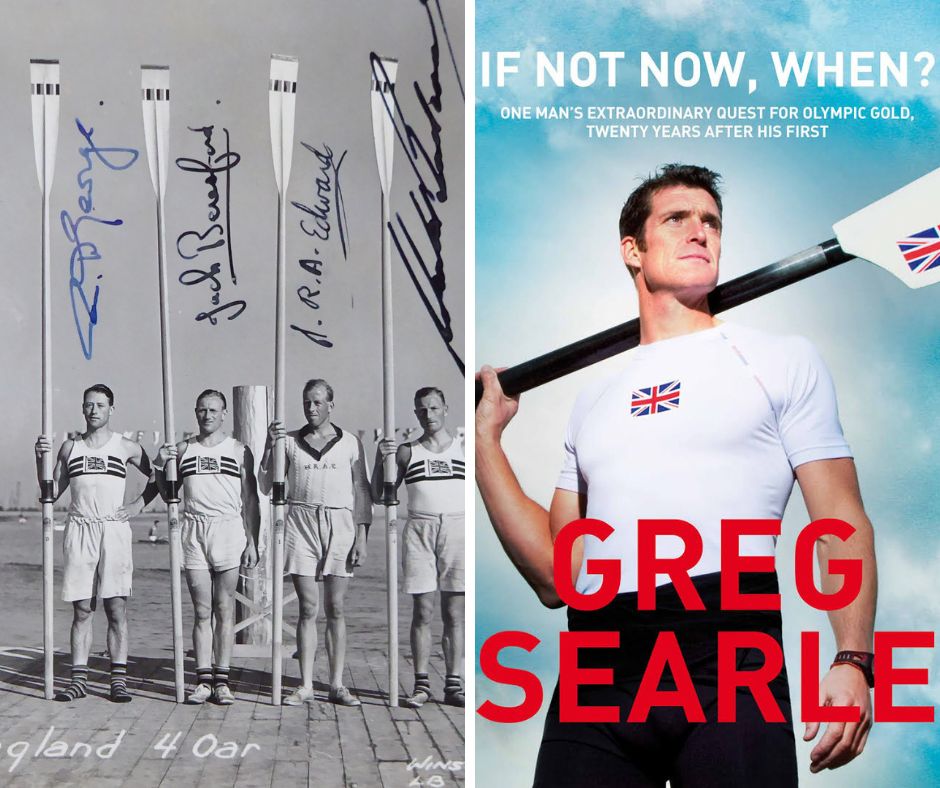Last Thursday 16 May, John Beresford came to Leander Club to talk about the book he wrote about his father Jack Beresford, the eminent rowing Olympian who won five medals at five Olympic Games in succession in the 1920s and 1930s. The book is titled Jack Beresford, An Olympian at War.
This Rowing Book Talk is part of Series 2 of the Leander Library Rowing Book Talks, which are held in aid of the Leander Trust, a registered charity (No. 284631) to advance the lives of young people through rowing. The charity has created opportunities for young people to fulfil their rowing potential. It is truly making a difference in the lives of young people. At the start of the talk, Ryder and Byron, both young rowers in the junior rowing programme at Leander came to tell the audience how rowing had changed their lives. Both told their stories of how they had moved to Henley supported by the Leander Trust to develop as high-performance oarsmen and how they are now hoping to study in the USA on rowing scholarships. It was truly inspiring to hear their stories.
John Beresford’s book takes us through the life of Jack Beresford. He was born in 1899 and went to Bedford School where he was mainly a rugby player but also Captain of Boats after his father before him. In fact, the jacket worn by John at the talk was his father’s original 1916 Bedford Captain of Boats jacket! When Jack finished school, at the age of 19, he went to France to fight in the First World War. While there, Jack wrote 119 letters to his parents, which are printed in the book. The letters provide a unique and moving account of what it was like to be living during the war. They also show Jack’s resilience and strength of character and his firm belief that “they’d never hit him”. The average lifespan of a soldier in France during the First World War was reckoned to be 14 days and he was out there and survived for 6.5 months. Eventually, he was wounded and returned to England with a shin wound that stopped his rugby career. It has been said that this was Rugby’s Loss, but Rowing’s Gain.
Jack Beresford’s rowing career continued during his rehabilitation from his war injury and soon afterwards, he rowed at the 1919 Henley Royal Peace Regatta with his father. At the talk, Tim Crooks, a rowing Olympian himself with a Rowing Book due to be published later this year, spotted his grandfather in the no. 3 seat in that particular boat in the race programme! Jack Beresford later went on to win the Diamond Sculls 4 times, the Silver Goblets and Nickalls and Grand twice, and also the Stewards and Double Sculls at Henley Royal Regatta and he was elected a Steward of Henley Royal Regatta in 1966.
His first Olympics was the 1920s Olympics, where he won the Silver medal 1 second behind the Gold medallist Jack Kelly (Princess Grace’s father). John told us that that was the smallest margin ever until the 2016 Olympics where Mahé Drysdale won by a bow ball! After this, he won Gold at the 1924 Olympics, Silver at the 1928 Olympics, and Gold at the 1932 and 1936 Olympics. Gavin Jamieson, who held a Rowing Book Talk at Leander last autumn, attended the talk as his grandfather-in-law had rowed with Jack Beresford in the 1932 Olympics.
All winners at the 1936 Berlin Olympics received an oak tree which Jack planted at Bedford School. Years later, the tree was taken down due to expansion, but the timber was kept and some it made into honorary plaques. One of the guests at the talk said that he was the owner of one of those!
After retiring from competitive rowing, Jack sat on the British Olympic Council and on Organising Committee for the 1948 London Olympics, was on the ARA (former British Rowing) Council and President of Thames Rowing Club. Jack Beresford died at the age of 78 when the day before his death he had still rowed and attended a Thames Rowing Club annual dinner. Two of the guests at the Rowing Book Talk at Leander had attended the same dinner and fondly shared their memories of that evening.
The book, confirmed by John’s account of his father during the talk showed that Jack Beresford was a determined man. His experiences battling during the war and his extraordinary achievements in rowing likely stem from that same character trait he had in abundance.
This concludes the Series 2 of the Leander Library Rowing Book Talks. Series 3 starts in September with Greg Searle visiting on Thursday 5 September to talk about his book If not now, when?. Tickets are available for sale here: https://www.eventbrite.co.uk/e/book-talk-greg-searle-if-not-now-when-tickets-788991884967. The Rowing Book Talks are open to all and run in aid of the Leander Trust and the ticket price includes a generous finger buffet in the beautiful dining room at Leander Club overlooking the River Thames.

